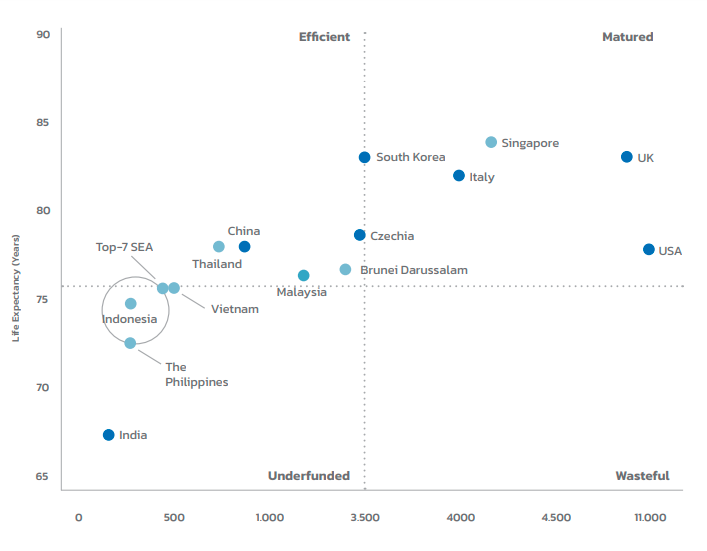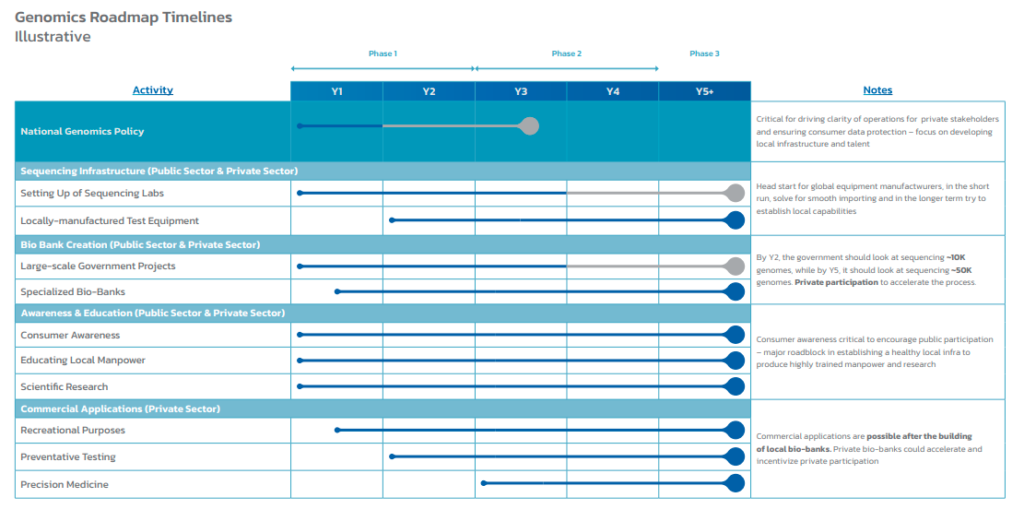Road Map of Genomic Development in Indonesia
Collaboration between the public and private sectors is needed to realize a road map for genomics development in Indonesia
Biotechnology is still a sector that is not much in demand in Indonesia. On average, this sector is still held by large companies and conglomerates, or research-based startups. Development also takes a relatively long time because it requires a lot of capital to start building without certainty of income.
Currently, not a lot of venture capital has entered the sector, even classified underfunded. Based on data from the report "Genomics: Leapfrogging into the Indonesian healthcare future" from East Ventures, Indonesia is also considered to be still lagging behind in terms of life expectancy and health budget utilization in Southeast Asia, as well as the global average.

Minister of Health Budi Gunadi Sadikin once stated that Indonesia has two main problems that occur in the health sector. First is the increasing cost of health per capita. And the second is that most of our healthcare systems are focused on the curative side rather than the preventive side.
Meanwhile, this country is also said to be experiencing an increase in cases of Antimicrobial Resistance, which is hindering the effectiveness of medical treatment. This has contributed to making Indonesia one of the countries with the highest mortality rate due to non-communicable diseases (80%), 7% higher than the world average.
The Ministry of Health has recognized this as a crucial area of concern. In August 2022, the Ministry of Health, in collaboration with East Ventures, supported the strengthening of innovation in Indonesia's health sector by launching the Biomedical & Genome Science Initiative (BGSi).
This program is designed to develop more accurate treatments for the community through the use of technology in collecting genetic information (genomes) from humans and pathogens such as viruses and bacteria or it can also be called whole genome sequencing (WGS). Previously, the WGS method itself had been used and played an important role in preventing COVID-19 in Indonesia.
Apart from being an alternative in providing preventive care and appropriate treatment solutions, genomics has the potential to provide significant economic benefits for Indonesia.
Developing the genomic landscape in Indonesia can result in increased productivity for patients whose disease is detected early and who do not have to leave the workforce. In addition, it can also help lower overall health care costs due to early detection and targeted treatment. This has the opportunity to drive economic value growth worth $ 110 billion in Indonesia.
Public and private sector collaboration
Compared to other countries such as China, Korea, Britain or the United States, Indonesia is still in a very early stage, behind Malaysia and Vietnam. The US and UK lead the way in the area of genomics research and national studies. One of the things that keeps America ahead is because of broader private sector participation.
Recently, China and Korea have also begun to develop limited clinical applications of genomics. Private sector participation remains at the bottom layer. In contrast to America, Korea limits the area and scope of genomics to the private sector in the country.
In order to realize optimal genomics development, the Ministry of Health in collaboration with East Ventures has prepared a roadmap for genomics development in Indonesia.
There are four key pillars for optimally developing the field of genomics, including infrastructure, investment, human resources, and regulation. The regulatory framework is the first step towards establishing a genomic ecosystem and addressing the major concerns of private players.
There are 3 aspects that need to be considered in the regulation of genomic development. First, regarding privacy and ethical use of data. Second, around the management, sharing, storage, and processing of data. Third, the simplification of ethical and other approvals for the use of biological samples for clinical trials
From the funding side, it is also said that the government needs to be active in providing funding solutions, for example: the budget for making critical genomic infrastructure, subsidies and tax incentives for the private sector, as well as the allocation of funds to medical colleges for human resource development.
While investing in genomics is still relatively new, East Ventures has demonstrated confidence in the sector since 2018 through its portfolio company, a startup focused on genome sequencing such as Nalagenetics and Nusantics.
MDI Ventures and Bio Farma have also formed managed funds "Bio Health Fund" of $ 20 million or around 292 billion Rupiah which the two of them will use to target startup investments early and growth stages area-focused Biotech and health services in Indonesia.
More Coverage:
Regarding core infrastructure, Indonesia has now set up bio banks and data centers along with other important sequencing infrastructure such as genome sequencing machines, equipment and laboratories. Furthermore, EHR development is also very important to ensure genomic data and studies can be used for the creation of end-use applications and clinical solutions.
In this case, the private sector can assist the government in data centers, and set up new biobanks while foreign players can provide sequencing machines and related infrastructure. In other infrastructure areas, government participation is very limited, while only a few private sector players operate in this space.
Several private players who have entered the field of genomics include NalaGenetics, Nusantics, and biotech startup Asa Ren which claims to be the first company in Indonesia to focus on managing DNA data. The company also recently succeeded in obtaining funding worth 123 billion Rupiah.
The following is a timeline illustration of the roadmap for genomics development in Indonesia:

Sign up for our
newsletter
